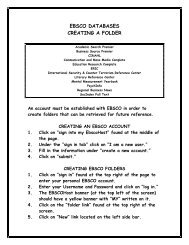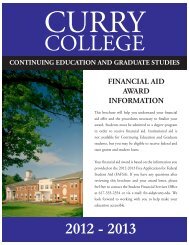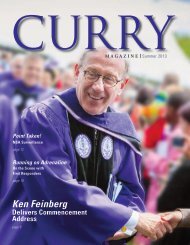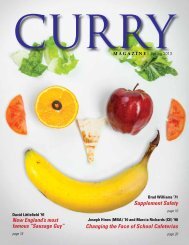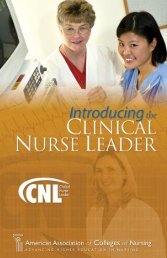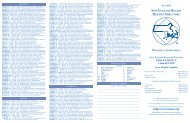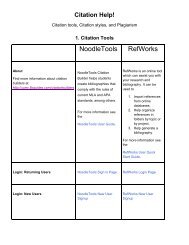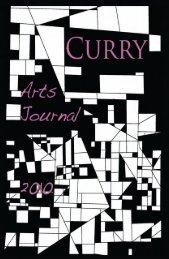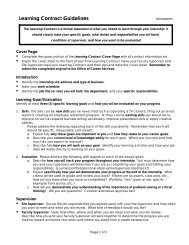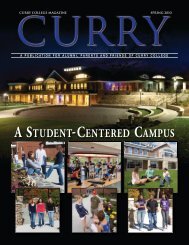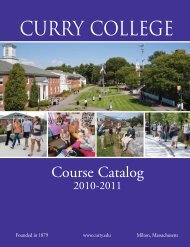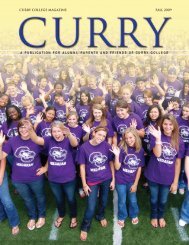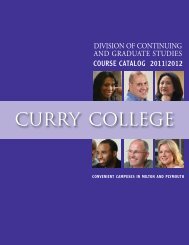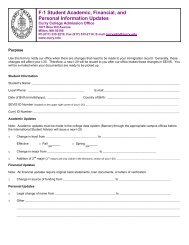Read the Curry College NEASC 2012 Self-Study Report.
Read the Curry College NEASC 2012 Self-Study Report.
Read the Curry College NEASC 2012 Self-Study Report.
Create successful ePaper yourself
Turn your PDF publications into a flip-book with our unique Google optimized e-Paper software.
28<br />
submitted to <strong>the</strong> department chair, and scheduled monthly meetings are devoted to academic<br />
review and oversight. The Nursing, Education, and Criminal Justice programs are accountable to<br />
outside accrediting agencies that oversee <strong>the</strong>ir curricula and program outcomes; <strong>the</strong> remaining<br />
academic areas develop <strong>the</strong>ir curricula, including internships and field experiences, based on<br />
<strong>the</strong> department’s academic plan and learning goals, consistent with <strong>the</strong> <strong>College</strong> mission.<br />
The award of transfer credit is based upon departmental review of <strong>the</strong> course description and<br />
syllabus and is awarded through <strong>the</strong> Registrar’s Office, which also maintains a data base of<br />
approved courses. Guidelines for credit approval are described, both in print and electronically,<br />
in <strong>the</strong> Catalog and a tool for assessment of credit approvals is available on <strong>the</strong> website; a<br />
minimum of one fourth of students’ credits must be completed at <strong>Curry</strong> including required<br />
work in <strong>the</strong> major and at <strong>the</strong> 2000 or 3000 level. lx <strong>Curry</strong>’s policy on <strong>the</strong> credit hour was revised<br />
by <strong>the</strong> Undergraduate Academic Policy Committee in compliance with new federal guidelines. lxi<br />
A list of articulation agreements is available on <strong>the</strong> website. lxii<br />
Learning Outcomes Assessment<br />
Assessment of student learning at <strong>the</strong> institutional, programmatic, and course levels has been<br />
an area of substantial focus at <strong>Curry</strong> <strong>College</strong> during <strong>the</strong> past decade. Multiple initiatives have<br />
contributed to demonstrable progress on <strong>the</strong> development of clear and shared learning<br />
outcomes statements, implementation of outcomes assessment, and <strong>the</strong> use of assessment<br />
lxiii, lxiv, lxv<br />
information to inform improvements in academic programs.<br />
Developing systematic and sustainable structures across areas of <strong>the</strong> college to lead and<br />
support this enterprise has been a priority. In 2009, a Dean of <strong>the</strong> Faculty was appointed to<br />
provide guidance, oversight, faculty development, continuity, and management of resources for<br />
learning outcomes assessment. An Assessment Task Force was subsequently appointed in 2010<br />
to make recommendations for a Standing Committee to coordinate, process, and utilize results<br />
from student learning assessment on an ongoing basis. The Task Force’s recommendations led<br />
to <strong>the</strong> 2011 launch of a reformed Learning Outcomes Assessment Committee (LOAC), with a<br />
revised membership and charge (see LOAC Charge, Membership, and Structure, all of which are<br />
located in <strong>the</strong> workroom). lxvi The LOAC is charged not only with monitoring and evaluating<br />
institutional progress, but also with consulting (as local experts) on assessment efforts and<br />
advocating for resources, such as faculty reassigned time and funding for key assessment<br />
projects and pilots that go beyond routine work.<br />
Since early 2011, <strong>the</strong> LOAC has:<br />
• Developed and implemented workshops in April 2011 for both academic and student<br />
affairs departments to evaluate progress, choose meaningful next steps, and plan and<br />
implement actions on learning outcomes assessment. (Workshops were attended by 40<br />
faculty members, representing all academic departments and >50% of interdisciplinary/<br />
non‐departmental programs; and 12 Student Affairs staff.) lxvii ;<br />
• Provided academic area planning/assessment retreats in May 2011, with committee<br />
members serving as guest facilitators;<br />
<strong>Curry</strong> <strong>College</strong> <strong>2012</strong> <strong>Self</strong>-<strong>Study</strong><br />
Standard Four



